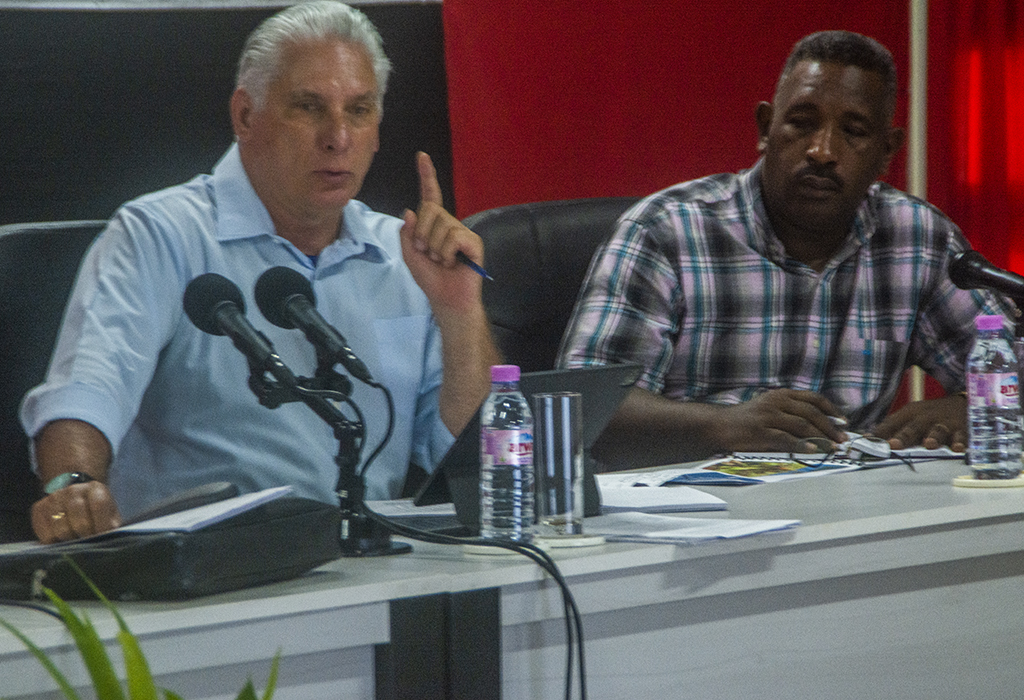
It is urgent to name the solutions, going from contemplation of the problems to concrete action to solve them, said the first secretary of the Central Committee of the Cuban Communist Party (PCC) and president of the Republic, Miguel Díaz-Canel Bermúdez, summing up his working visit to the Majibacoa municipality.
Majibacoa, Las Tunas.- There is inconsistency between what is said and what is done, he said after listening, together with the Secretary of Organization of the PCC Central Committee, Roberto Morales Ojeda, to the report of the commission of the aforementioned body that for two days took a snapshot of the current life in Majibacoa. The report also made clear the concerns of the local population: the energy situation, delays in the arrival of products from the basic family basket of goods, inflation, and crimes against livestock.
The poor results of the local agro-industrial company, according to the evaluation body, are pushing the economy of Majibacoa backward, as its poor performance has severely affected almost half of the monetary and productive indicators of the region. Negative figures are also recorded here in crucial matters in this area, such as beef and milk production and the harvest of various crops.
As has been noted in the other municipalities, in Majibacoa, discussions on the most pressing difficulties in their respective areas are often absent from the regular meetings of the Party's grassroots organizations.
Díaz-Canel directly questioned the directors of the different administrative entities on how to deal with these situations. "We can't come and tell you, you must be the ones to find the solutions based on your knowledge of your reality. The economy must be analyzed based on its indicators,’ he warned.
The first ones who have to defend the companies in their territory are the municipalities, otherwise municipal autonomy does not exist, he stressed; and what is happening in the Acopio business system, excessively focused on the provincial structure, shows that this thinking is not in everyone, he warned.
In terms of budget management in the municipalities, the Cuban President announced that there will be more rigorous demands on the destination of expenditures and revenues, and on the transparency and legality of relations between the public and private sectors.
He said that banking and the digital economy must begin with food establishments, which today account for 70 percent of Cubans' daily expenses.
The political authorities in Majibacoa agreed that they must broaden their links with the structures closest to ordinary citizens. They admitted that they must be more rigorous in confronting indiscipline within the internal life of political and mass organizations in this territory.
Why is this not being done, asked Roberto Morales Ojeda. "In this municipality, there are people who get up every day to push the work forward and move the country forward,’ he said, but this is not expressed in the growth that should be occurring in the party membership. The first thing to plan for a party cadre is its contact with the grassroots," he said.
Díaz-Canel demanded that the Government and Party leaderships in the Balcón del Oriente Cubano address as soon as possible the concerns raised by the dockworkers in the port of Carúpano regarding their working conditions and salaries; the delays in the payment of education workers in the municipalities of Las Tunas and Jobabo; and the non-fulfillment of the plans for sowing and cultivation of crops. Each situation has proposed solutions, said Jaime Ernesto Chiang Vega, governor.
‘If the Provincial Party Committee does not break the inertia of the cadres, we will not move forward,’ said its first secretary, Walter Simón Noris, who did not forget his primary responsibility to change this state of affairs, on the contrary. "We cannot go to sleep with things still to be solved," he stressed.